
Domnul profesor Andrei Brezianu - a conferintiat despre Vladimir Ghika şi spiritul Predicii de pe Munte, la Congresul internaţional - Il volto delle creature ad immagine e somiglianza di Cristo, organizat de Institutul international de cercetare asupra chipului lui Cristos, la Roma, in data de 11 octombrie 2009. Versiunea italiana a conferintei o gasiti la adresa: http://www.vladimirghika.ro. In continuare avem textul original:
The beatitudes in the life of a 20th century martyr: Romania’s monsignor Vladimir Ghika
“The Sermon on the Mount is a summary of the entire Gospel. The Beatitudes – a summary of the Sermon”. This thought-provoking quote from French bishop and orator Bossuet may prompt the consideration of a further spiritual summation: deep down, in the pith of the message the Beatitudes convey, what is being revealed is the face of Christ. In a mystical sense, the Sermon of the Beatitudes offers indeed one of the most faithful portraits of Christ we possess. It is also a life-model the follower of the Lord is offered for imitation. Stemming from the Beatitudes Sermon, Christ’s inner life and bland face, which the Spirit would reproduce in us so as to reshape ourselves in His likeness, become tangible, fundamental features offered to the Christian to grasp, try to imitate and follow.
Exempla trahunt. The saints are those who offer guidance along the arduous path on which, in the wake of the Sermon on the Mount, blessedness proves to be the reverse of worldly glory, arrogance and earth-born happiness, the opposite of the world’s ways to seek delight in pomp, material wealth and the other human drives craving the glitter of perishable things.
Against the grain of the world’s ways of pursuing satisfaction, the saints are living proofs of the actuality of the evangelical Beatitudes. In keeping with what Saint Paul has called the folly of the Cross, they show how true, lasting bliss goes hand in hand with renunciation, self-denial and abnegation. They teach us that happiness can also mean being reviled and persecuted on Christ’s account (Mt.5:11); that happiness means being able to sacrifice everything --even one’s own life—as a supreme statement of one’s love for Christ, so as to humbly share with Him, if need be, the bitterness of the chalice, the pain, the passion and the agony of the Cross --folly to the world indeed— the very folly which overturns the logic of fleshly power and opens the gates of Heaven.
A recent example of someone having heroically practiced such a path to happiness --in which renunciation, self-abasement and sacrifice proved to be not an impediment but a conduit to peace and contentment-- is the case of the Servant of God Vladimir Ghika, one of the many contemporary examples of Christians for whom, what we may call “the beatitude of the persecuted”, has been joyfully embraced as a gift, eventually turned into a full oblation of the self, down to the last breath. Such is the example of Monsignor Vladimir Ghika, blessed to offer his life for Christ and His Church in a Romanian communist prison in 1954.
Vladimir Ghika was born a prince in a stately palace, on Christmas day in 1873, the son of an illustrious diplomat, descendant of one of the wealthiest princely families of Moldavia. His grandfather, Gregory Ghika the Vth, was the last reigning Prince of the Principality of Moldavia. Vladimir was educated in France and grew up in the fashionable milieu of Parisian high society of the epoch. He converted in Rome in 1902 and became a faithful son of the Catholic Church. Thereafter, as a devout layman, he continued to lead a handsome life in the diplomatic, cultural and political circles of Paris, Rome, Thessaloniki and, of course, Bucharest. A brilliant intellectual, a sharp wit, a charming person in every respect, Vladimir Ghika was a man of many gifts and talents, --a writer, a poet, a designer, a playwright, an historian, the author of several books. He could have achieved fame as a cultural or artistic personality, like some of the noted contemporaries he befriended --Jacques Maritain, Henri Bergson, Francis Jammes, Paul Claudel, among others; or a political or diplomatic personality, like his forebears; like his own brother, Demetrio Ghika. Yet, against the grain of his exceptional natural gifts, Vladimir Ghika chose to give priority to grace, to the study of Christ and of the divine sciences. It was here in Rome, at the Angelicum that, in 1905, he took his doctorate in Theology, while continuing as a layman to put his intellectual and moral energies in the service of Christ and of his fellow beings. "There is nothing more likely to scare the wordly-minded than Jesus Christ’s Beatitudes” – Vladimir Ghika wrote . Embracing without fear the deep truth of Christ’s Beatitudes, the young convert despised wordly distinctions and honors. While still a layman --alongside other pursuits— he personally dedicated an increasing share of his activities to the poor, to the sick, to all sorts of charities .
A selfless servant of the indigent, in 1912 he founded the Hospital of the Sisters of Charity in Romania’s capital, Bucharest. During the first World War he visited prisoners on both fronts, shuttling between France, Romania and Italy where, in 1915, he took an active part in the rescue and relief operations of the victims of the devastating Avezzano earthquake in the Abruzzo, the like of which we all witnessed in the catastrophic destruction of Dell’Acquila this year.
On the other hand, side by side with his brother, stationed for some time in the Eternal City as an envoy, Vladimir Ghika took part in a string of social and political events triggered by the First World War and its finale, including an important personal contribution to the establishment of Romania’s relations with the Holy See and the creation of the first Papal Nunciature in Bucharest in the aftermath of the war. Gradually parting with princely etiquette and lay pursuits, Vladimir Ghika was soon to relinquish his wealth, give up inheritance rights and possessions and start a new life entirely dedicated to his fellow beings.
A definitive turn in his life as a layman occurred in 1919 -- after an interval of reflection during a memorable stay with friends in the peaceful surroundings of the Talloires resort on Lake Geneva. At that point in time, upon mature consideration, his vocation to the grace of priesthood became a a certainty. Soon after, at the age of 50, he was ordained a priest and humbly started a new life in poverty, first serving as pastor of a dejected working-class parish in the vicinity of Paris, Villejuif. His life as priest was to continue, governed by the virtues of humility and obedience. Later on, given his works and the the reputation of dedication he had earned in the service of the Church, Pope Pius XI named him Protonotarius Apostolicus. In that capacity Monsignor Vladimir Ghika took part in a variety of missions worldwide, from Congo to South America and Japan, notably on the occasion of the Eucharistic Congresses of Sidney, Carthage, Dublin, Buenos Aires, Manila and Budapest.
The outbreak of the second World War found him in Romania where, under airstrikes and bombardments, he continued his apostolate, serving the poor, the sick, the wounded, the prisoners and the underprivileged. During the last decades of his life, stranded in Romania, he consecrated most of his energies to the service of the destitute of his country’s society. After the communist takeover in 1948 he stubbornly continued his apostolate and unflinchingly countered the atheist government’s attempts to cut Romania’s Catholic Church links with Rome and to establish a schismatic national church.
Against all odds --at that time almost an octogenarian--, Monsignor Ghika risked his liberty and life by entertaining to that effect secret contacts with the Vatican. One of Monsignor Ghika’s memorable sayings was [and I quote]: ”Those who love God are ready to discover new beatitudes in every situation, quite often where they are least expected”…
In the end, his was the God-given gift of discovering, for the love of Christ, yet another facet of that fundamental truth: namely, in the terminal condition of a convict, in a persecutors’ extermination prison.
In 1952, as a consequence of his daring actions, he was thrown in jail where he suffered torture and unspeakable humilitations. He faced death with serenity on many occasions, including in the ordeal of mock executions. The cruelty and hardships of his experience in the Jilava extermination prison can hardly be described. During his passion at the hands of his persecutors in jail, his sufferings took on deeper meaning and a higher inspiration, fed by all of his previous experiences of abnegation and sacrifice for his fellow beings and the love of Christ. While in jail, he offered spiritual comfort to his fellow prisoners, identifying himself with the sufferings of Christ, bearing the image of Christ to his fellow detainees. For his fellow prisoners he was an image of mercy and caring: in the midst of the communist extermination ordeal, he was a living reminder of the redeeming dimension of pain and suffering, proclaiming his affiliation with the crucified Savior, the choice that led him to humbly share the Savior’s fate: arrest, torture, ignominious death.
Monsignor Vladimir Ghika’s death was to be the culmination of his life-long option to die to the values of the world and of its glories. A selfless friend, a man of prayer, a sufferer, a winner of souls, a preacher, a teacher, a man of feeling and, last but not least, a man who sacrificed his life for the Lord , Monsignor Vladimir Ghika’s stature and spiritual influence after his death is such that the Church is in the process of examining his case for elevation to the ranks of the blessed.
"O sweet Lord, may I live a life in the likeness of yours! …O sweet Lord, may I die a death in the likeness of yours”, was one of Monsignor Vladimir Ghika’s favorite prayers.
No other echo of Christ’s teaching on the Beatitudes seems more appropriate to serve as a conclusion to this modest presentation of a 20th century witness --a grain of the salt of the earth, a seed in the harvest of the Lord-- blessed to have offered his life for Christ and His Church as a martyr .

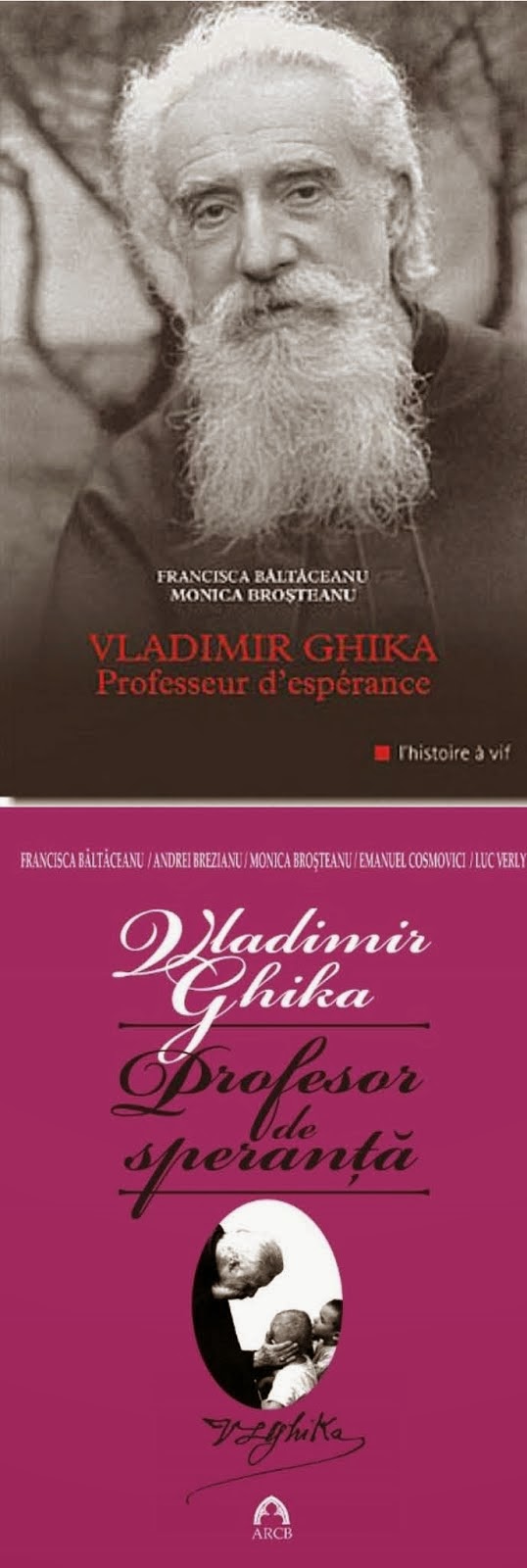






















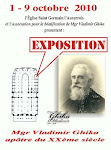



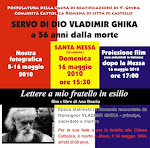
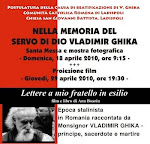




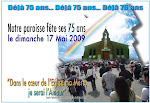



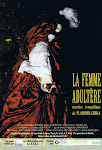








Niciun comentariu:
Trimiteți un comentariu